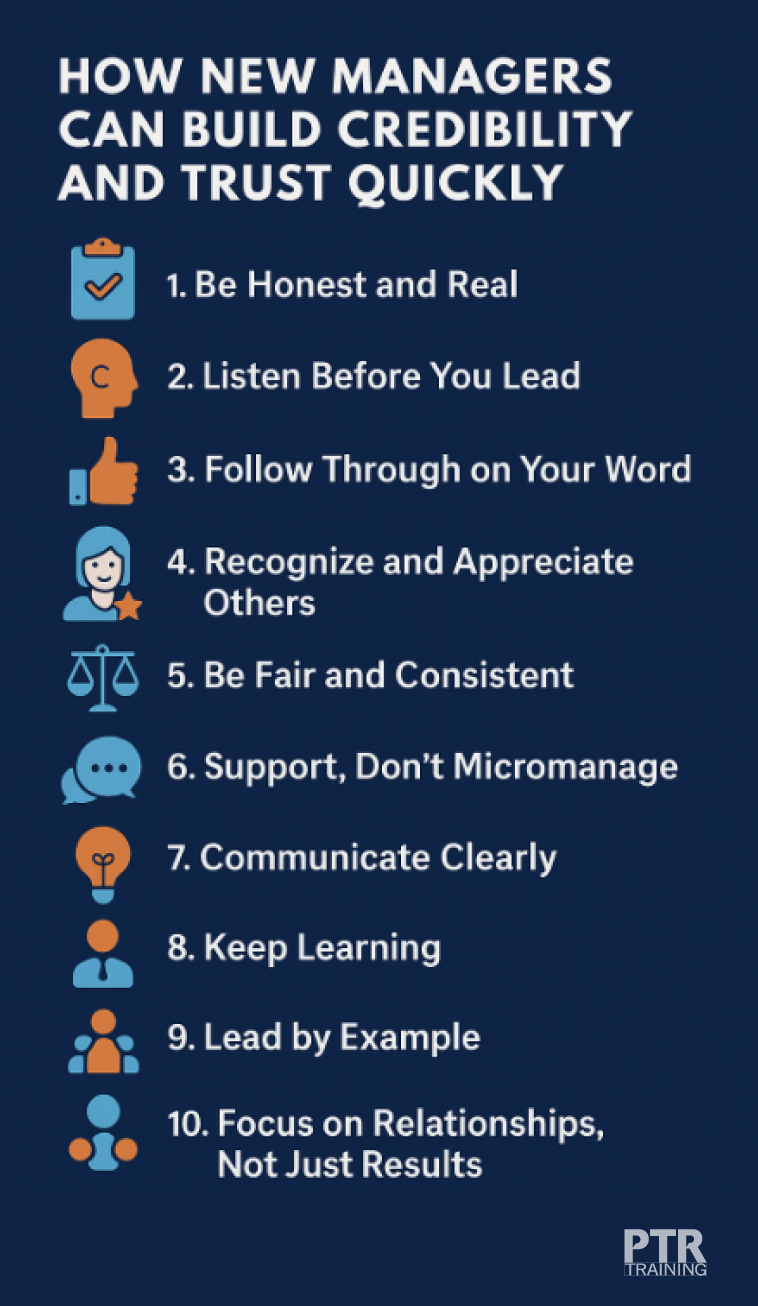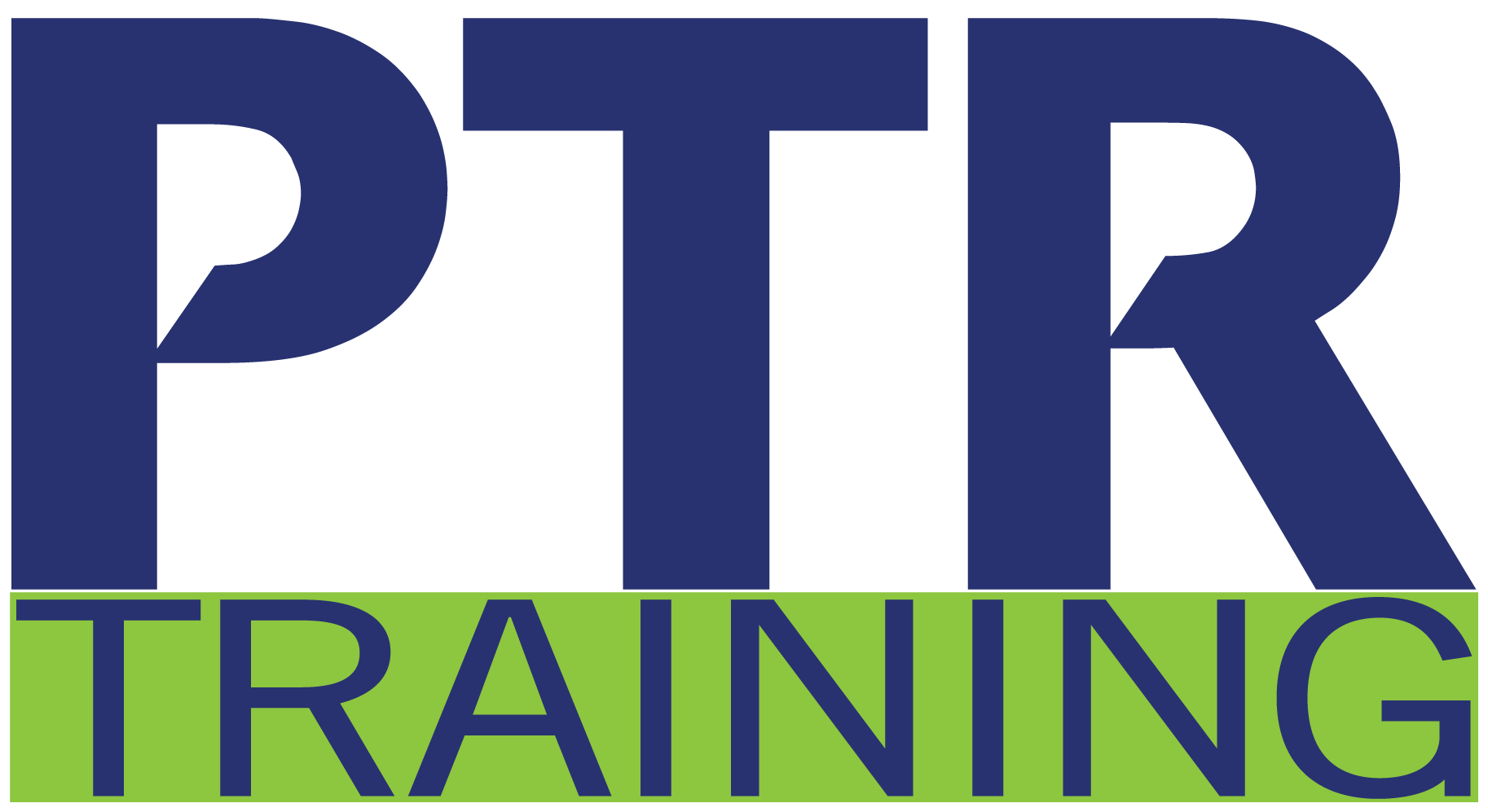
Stepping into a management role for the first time can feel exciting — and a little intimidating. One day you’re part of the team, the next you’re leading it. Suddenly, you’re responsible for decisions, direction, and people’s trust.
It’s a big shift, and many new managers feel pressure to prove themselves right away. But here’s the truth: credibility and trust aren’t earned through authority — they’re built through consistency, empathy, and action.
Whether you’re managing a small team or a large department, the way you handle those first few months sets the tone for everything that follows.
Let’s explore some practical ways to build credibility and trust from the very start.

The 7 Ways New Managers Can Build Credibility and Trust
Whether you’re leading a small team or a large organisation, these ten tips provide a roadmap to becoming a more emotionally intelligent leader. Start with one or two today, and you’ll begin to see stronger connections and lasting positive change in your team dynamics.
1. Be Honest and Real
When you’re new to management, it’s tempting to act like you have all the answers. But your team will appreciate honesty far more than perfection. Honesty and accountability go hand in hand — both key traits of strong, accountable leadership. When your team sees you taking responsibility and being transparent, their trust grows naturally.
If you don’t know something, say so — and then work on finding the answer together. When people see that you’re open and genuine, they’ll trust you more quickly.
Transparency shows strength, not weakness. It says, “I’m learning, and I’m here to do my best with you.” That kind of humility lays the foundation for long-term respect.
2. Listen Before You Lead
Before making changes or setting new rules, take time to observe and understand how things work. Listen to your team’s challenges and what they value.
Ask questions like:
- “What’s working well right now?”
- “What could make your job easier?”
- “How can I support you better?”
When people feel heard, they become more open to your leadership. Listening helps you make smarter decisions — and builds trust faster than any speech ever could. In fact, strong listening and communication skills, which are key parts of Leadership Communication Course, often start with simple daily awareness — paying attention, asking thoughtful questions, and showing genuine interest in what your team says.
3. Follow Through on Your Word
Reliability is the heartbeat of credibility. If you say you’ll do something — do it.
When you keep your promises, even small ones, your team learns that they can depend on you. On the other hand, broken promises — even unintentional ones — can quickly damage trust.
If only 21% of employees strongly agree they trust their organisation’s leadership, this tells us how rapidly credibility can erode. Consistent communication and action helps you belong in that trusted group.
Being consistent in your words and actions creates a sense of stability that every team needs. It tells people, “You can count on me.”
4. Recognise and Appreciate Others
One of the quickest ways to earn respect is to acknowledge effort. Celebrate your team’s wins — big or small.
A simple “I noticed the effort you put into that report, thank you” can mean a lot. Public recognition, done sincerely, boosts morale and loyalty. As a manager, remember: when your team shines, you shine too. Great leaders lift others, not just themselves.
According to SHRM, 79% of employees leave jobs because of a lack of appreciation. Recognition fuels motivation and engagement.
5. Be Fair and Consistent
Nothing breaks trust faster than double standards. Treat everyone with fairness — whether they’re your closest colleague or someone you barely know.
Make decisions based on facts, not favourites. When mistakes happen, focus on solutions, not blame.
Your consistency shows that you care more about doing what’s right than what’s easy. That’s the kind of leadership people remember and respect.
6. Support, Don’t Micromanage
Micromanaging sends a message that you don’t trust your team. Instead, give people space to make decisions, and check in for guidance rather than control.
Empowering others builds their confidence and gives you more time to focus on the bigger picture. A good rule to follow: guide, don’t hover. Trust your team to deliver — and step in only when truly needed. A Gallup report found that 70% of team engagement variance is tied to the manager’s behavior. Empower people to own their work instead of controlling every step.
7. Communicate Clearly
Clear communication prevents confusion, frustration, and mistakes. Always explain the “why” behind your decisions — not just the “what.”
When your team understands the purpose behind their work, they’ll be more motivated and engaged.
Keep everyone informed about changes and priorities. Even quick check-ins or brief updates can help people feel valued and included.
8. Keep Learning
No one becomes a great manager overnight. The best leaders are constant learners — they ask for feedback, seek new knowledge, and adapt over time.
Consider connecting with mentors, reading about leadership, or joining workshops that strengthen your management skills. For instance, PTR offers programs like Fundamental Leadership Series, Effective Leadership Skills, and Coaching for Maximum Performance — all focused on helping new leaders grow practical skills that build credibility naturally. Because leadership isn’t a one-time skill — it’s something you refine with every experience.
Every challenge you face as a manager is a lesson in disguise — use it.
9. Lead by Example
The most powerful way to earn trust is simple — walk your talk.
Show the same level of accountability, respect, and professionalism you expect from your team. If you’re calm under pressure, your team will be too. If you own your mistakes, they’ll feel safe owning theirs.
Leadership isn’t about demanding excellence — it’s about demonstrating it.
10. Focus on Relationships, Not Just Results
Of course, performance matters. But leadership isn’t just about targets and timelines — it’s about people. Take time to connect beyond tasks. Ask about your team’s goals, challenges, and ideas. Build real relationships based on mutual respect and empathy.
Even though 86% of executives say they have a very high level of trust in their employees, only 60% of employees believe their leaders trust them. One of your jobs as a new manager is to close that gap by showing trust in your team first.
People will remember how you made them feel far more than how you managed their deadlines. When your team feels supported and understood, they’ll give you their best work — not because they have to, but because they want to.
If you ever want to strengthen your approach to building team synergy, the Leading Teams and Building Coalitions course offers practical frameworks — but again, it all starts with genuine connection.
Ready to Lead with Confidence and Trust?
Great leadership isn’t about titles — it’s about actions that earn respect day by day. If you’re stepping into a new management role and want to build credibility, trust, and lasting impact, PTR’s leadership and management training courses can help you get there. Through practical, real-world learning — both virtual and in-person — you’ll strengthen the skills that matter most: communication, accountability, and authentic connection.
Start your leadership journey today and grow into the kind of leader people trust to guide, inspire, and deliver.










